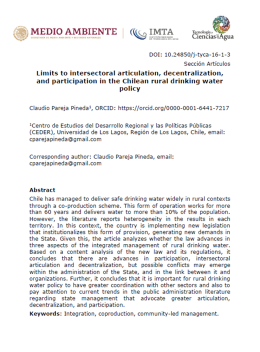RWSN Library

Author
Claudio Pareja Pineda
Year of Publishing
Publisher
Centro de Estudios del Desarrollo Regional y las Políticas Públicas (CEDER)
Institution
Universidad de Los Lagos
Limits to intersectoral articulation, decentralization, and participation in the Chilean rural drinking water policy
Description:
Chile has managed to deliver safe drinking water widely in rural contexts through a co-production scheme. This form of operation works for more than 60 years and delivers water to more than 10% of the population. However, the literature reports heterogeneity in the results in each territory. In this context, the country is implementing new legislation that institutionalizes this form of provision, generating new demands in the State. Given this, the article analyzes whether the law advances in three aspects of the integrated management of rural drinking water. Based on a content analysis of the new law and its regulations, it concludes that there are advances in participation, intersectoral articulation and decentralization, but possible conflicts may emerge within the administration of the State, and in the link between it and organizations. Further, it concludes that it is important for rural drinking water policy to have greater coordination with other sectors and also to pay attention to current trends in the public administration literature regarding state management that advocate greater articulation, decentralization, and participation.
Bibliographical Information:
Claudio Pareja Pineda () Limits to intersectoral articulation, decentralization, and participation in the Chilean rural drinking water policy. , Universidad de Los Lagos , Centro de Estudios del Desarrollo Regional y las Políticas Públicas (CEDER) , Región de Los Lagos, Chile
More Information
DOWNLOADS (3)
Limits to intersectoral articulation, decentralization, and participation in the Chilean rural drinking water policy
 Google Übersetzer
Google Übersetzer
